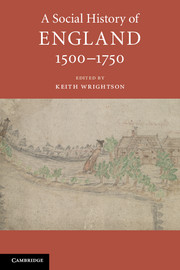Book contents
- Frontmatter
- Contents
- List of Figures
- List of Tables
- List of Contributors
- Acknowledgements
- List of Abbreviations
- Introduction: Framing Early Modern England
- PART I DISCOVERING THE ENGLISH
- PART II CURRENTS OF CHANGE
- 5 Reformations
- 6 Words, Words, Words: Education, Literacy and Print
- 7 Land and People
- 8 Urbanisation
- 9 The People and the Law
- 10 Authority and Protest
- 11 Consumption and Material Culture
- PART III SOCIAL IDENTITIES
- Coda: History, Time and Social Memory
- Further Reading
- Index
6 - Words, Words, Words: Education, Literacy and Print
from PART II - CURRENTS OF CHANGE
Published online by Cambridge University Press: 28 May 2018
- Frontmatter
- Contents
- List of Figures
- List of Tables
- List of Contributors
- Acknowledgements
- List of Abbreviations
- Introduction: Framing Early Modern England
- PART I DISCOVERING THE ENGLISH
- PART II CURRENTS OF CHANGE
- 5 Reformations
- 6 Words, Words, Words: Education, Literacy and Print
- 7 Land and People
- 8 Urbanisation
- 9 The People and the Law
- 10 Authority and Protest
- 11 Consumption and Material Culture
- PART III SOCIAL IDENTITIES
- Coda: History, Time and Social Memory
- Further Reading
- Index
Summary
Polonius: What do you read, my lord?
Hamlet: Words, words, words.
(W. Shakespeare, Hamlet (1601), II.ii.195)Among the greatest changes to come over English society between 1500 and 1750 were the expansion of educational provision, the growth in literacy levels, and the increased use of the written word in both manuscript and print. The consequences of these developments were profound and wide-ranging, and taken together they transformed the experience of almost everyone in England. By the mid eighteenth century, the ability to read the printed word had become a normal part of adult life; the capacity to wield a pen was an increasingly familiar accomplishment; and in books, pamphlets, single-sheets and all manner of printed ephemera people found the words that expressed their mental worlds and the ideas that structured their lives.
These changes were neither linear in their progress nor even in their effects. They were experienced in different ways by different people, in different times and places, and their selective impact provides graphic illustration of some of the fundamental distinctions that defined English society. In many ways there is no more powerful demonstration of the basic divisions – of wealth, rank and gender – that characterised the early modern period than the extent to which people had access to education and its fruits. In other ways it may be said that the proliferation of the written word and the diffusion of print culture contributed to the gradual reconfiguration of these hierarchies. New avenues of social mobility opened up; novel forms of information and opinion became available to more people; and all English men and women were, at some level, incorporated into a national culture founded upon text.
For the social elite education began at home under the guidance of a private tutor. The great families of the land could afford to employ the best: the philosopher Thomas Hobbes acted as tutor to the Cavendish family, earls of Devonshire; Lady Anne Clifford, daughter of the third earl of Cumberland, was mentored by the poet and historian Samuel Daniel. For the gentry, domestic instruction was no less the initial stage of a child's career. In the 1560s the future Lord Chancellor, Francis Bacon, was educated on the family estate in Norfolk before being sent to Cambridge at the age of twelve.
- Type
- Chapter
- Information
- A Social History of England, 1500–1750 , pp. 129 - 151Publisher: Cambridge University PressPrint publication year: 2017
- 1
- Cited by



